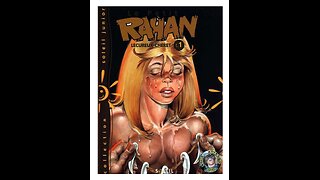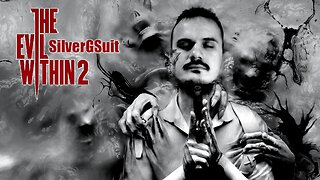Premium Only Content

Other Worlds: The Turner Diaries, Chapter 12
Chapter Twelve.
December 4, 1991. I went over to Georgetown today to talk to
Elsa, the little redheaded "dropout" I met there a couple of weeks
ago. The reason for my visit was to try to make a better evaluation
of the potential of some of Elsa's friends for playing a role in our
fight against the System.
Actually, some of them-or, at least, people in similar
circumstances-already are involved in their own war against the
System. In the last month there's been a bewildering proliferation
of incidents in which the Organization has not been involved.
These have included bombings, arson, kidnapping, violent public
demonstrations, sabotage, death threats against prominent figures,
even two widely publicized assassinations. Credit for the various
incidents has been claimed by so many different groups-anarchists,
tax rebels, "liberation fronts" of one stripe or another, half-a-dozen
far-out religious cults-that no one can keep up with it all. Every nut
with an ax to grind seems to have gotten into the act.
Most of these people are such careless amateurs that even our
racially integrated FBI has been doing a fairly creditable job of
rounding them up, but more seem to keep cropping up. The general
atmosphere of revolutionary violence and governmental counter-
violence that the Organization's activities have brought on is
apparently responsible for encouraging most of them.
The most interesting aspect of all this is the proof it represents
that the System's grip on the minds of the citizenry is less than
total. Most Americans, of course, are still marching in mental
lockstep with the high priests of the TV religion, but a growing
minority have broken step and regard the System as an enemy.
Unfortunately, their hostility is usually based on the wrong
reasons, and it would be nearly impossible to coordinate their
activities.
In fact, in the great majority of cases there is no reasoned basis at all for their activity.
It is really just a massive venting of
frustrations in the form of vandalism rather than political terrorism.
They just want to smash something, to inflict some injury on the
people they see as responsible for the unlivable world they are
forced to live in. Vandalism on the massive scale we are seeing
now is something with which the political police simply cannot
continue to cope for very long. It is running them ragged.
Besides the political vandals and the loonies, two other segments
of the population have been playing an important role in recent
events: the Black separatists and the organized criminals. Until a
few weeks ago everyone assumed that the System had finally
bought off the last of the nationalist-minded Blacks back in the
'70's. Apparently they've just been lying low and minding their
own business, and now they see a chance to get a few licks in.
Mostly they seem to have been blowing up the offices of Tom
groups and shooting each other, but they organized a pretty good
riot in New Orleans last week, in which there was a lot of window-
breaking and looting. More power to them!
The Mafia, two or three of the big labor unions they own, and a
couple of other organized-crime groups have been capitalizing on
the disorder and the public apprehension by substantially stepping
up their extortion activities. When they tell a businessman or a
merchant that they'll bomb his place of business unless he coughs
up a "protection" payment, they are more likely to be believed than
they were a few months ago. And kidnapping has become a big
business. The cops are too busy working on things the System is
really worried about (namely, us) to bother the professional thugs,
and they are having a field day.
Taking a strictly cold-blooded view, we must welcome even this
upsurge in crime, since it helps to undermine the confidence of the
public in the System. But the day must also come when we will
take every one of these elements which the System's "bought"
judges have coddled for so long and put them up against the wall
without further ado-along with the judges.
I knocked at the address Elsa gave me-it is the basement entrance
of what was once an elegant townhouse-and when I asked for Elsa
I was invited in by an obviously pregnant young woman with a
bawling infant in her arms. When my eyes adjusted to the dim
light, I saw that the whole basement is being used as a communal
living area. Blankets and sheets tied to the pipes which run along
the low ceiling serve to crudely partition off half-a-dozen corners
and niches as semi-private sleeping areas. In addition, there are
several mattresses on the floor in the main portion of the basement.
Other than a card table next to the laundry sink, where two young
women were washing some cooking utensils, there is no furniture,
not even a chair.
Against one wall there is an ancient, wood-burning stove, which
gives off the only heat in the basement. As I learned later, running
water is the only public utility which the little commune has at its
disposal, and they obtain fuel for their stove by scavenging in the
neighborhood or by sending a raiding party upstairs to break up
doors, bannisters, window jambs, even floorboards. Another, larger
commune occupies the upper portion of the house, beyond the
heavily barricaded steel door at the head of the basement stairs, but
they often indulge in wild drug parties, after which they are in no
condition to repel fuel-raiders from downstairs.
The basement dwellers shun hard drugs and regard themselves as
quite superior to the upstairs people. They nevertheless prefer the
grubby basement for themselves, because it is easier to heat and
easier to defend than upstairs, the only windows being a few tiny,
dirt-streaked panes near the ceiling, far too small to admit any
hostile intruder. In addition, it is cooler in the summer.
Seven or eight of them were sprawled on mattresses, watching
some inane "game" program on a battery-powered television
receiver and smoking marijuana cigarettes, when I entered. The
whole place was permeated by the stink of stale beer, unwashed
laundry, and marijuana smoke. (They don't regard marijuana as a
drug.)
Two small boys, about four years old, both stark naked,were rolling on the floor and fighting near the stove. A gray cat,
perched comfortably on one of the idle heating pipes near the
ceiling, stared down at me curiously.
The people on the mattresses, though, after a brief glance, paid no
further attention to me. I could see that none of the faces
illuminated by the TV screen was Elsa's. When the girl who had
admitted me called out her name, however, one of the blanket-
partitions in a far corner was suddenly thrust aside, and Elsa's head
and bare shoulders became momentarily visible. She squealed with
delight when she saw me, ducked back behind her blanket, and
emerged a moment later in her "granny" dress. I was vaguely
disturbed to catch a glimpse of another form on the mattress in the
dim recess as Elsa parted the blanket and came out. A twinge of
jealousy?
Elsa gave me a quick hug of genuine affection and then offered
me a cup of steaming coffee, which she poured from a battered pot
on the stove. I gratefully accepted the coffee, for the walk from the
bus stop had thoroughly chilled me. We sat on an unoccupied
mattress near the stove. The sound from the TV and the noise
being made by the crying baby and the two scuffling boys allowed
us to talk in relative privacy.
We talked of many things, for I didn't want to blurt out
immediately the true reason for my visit. I learned a lot about Elsa
and the people she is living with. Some of the things I learned
saddened me, and some profoundly shocked me.
I was saddened by Elsa's story of herself. She is the only child of
upper-middle-class parents. Her father is (or was-she hasn't been in
touch with her family for more than a year) a speech writer for one
of the most powerful Senators in Washington. Her mother is an
attorney for a left-wing foundation whose principal activity is
buying up houses in White, suburban neighborhoods and moving
Black welfare families into them.
Until she was 15 Elsa had been very happy. Her family had lived
in Connecticut until then, and Elsa had attended an exclusive,
private school for girls.
(Single-sex schools are illegal now, of course.) She spent the summers with her parents at their vacation
home on the beach. Elsa's face glowed as she described the woods
and trails around their summer home and the long walks she took
by herself. She had her own little sailboat and often sailed to a tiny
island offshore for private picnics and long, happy hours of lying
in the sun and daydreaming.
Then the family moved to Washington, and her mother insisted
that they take an apartment in a predominantly Black
neighborhood near Capitol Hill, rather than living in a White
suburb. Elsa was one of only four White students at the junior
high-school to which they sent her.
Elsa had developed early. Her natural warmth and open,
uninhibited nature combined with her outstanding physical charms
to produce a girl who had been extraordinarily attractive sexually
even at 15. The result was that the Black males, who also
continually badgered the one other White girl at the school, gave
Elsa no peace. The Black girls, seeing this, hated Elsa with special
passion and tormented her in every way they could.
Elsa dared not go into the restroom or even let herself out of the
sight of a teacher for a moment while she was at school. She soon
found that the teachers offered no real protection, when a Black
assistant principal cornered her in his office one day and tried to
put his hand inside her dress.
Each day Elsa came home from school in tears and begged her
parents to send her to another school. Her mother's response was to
scream at her, slap her face, and call her a "racist." If the Black
boys were bothering her, it was her fault, not theirs. And she
should try harder to make friends with the Black girls.
Nor did her father offer her any comfort, even when she told him
about the incident with the assistant principal. The whole issue
embarrassed him, and he didn't want to hear about it. His
liberalism was more passive than her mother's, but he was usually
intimidated by his thoroughly "liberated" wife into going along on
any matters that touched on race.
Even when three young, Black
thugs accosted him on his very doorstep, took his wallet and wristwatch, and then knocked him down and stomped on his
eyeglasses, Elsa's mother wouldn't let him call the police and
report the robbery. She regarded the very thought of filing a police
complaint against Blacks as somewhat "fascist."
Elsa stood it for three months, and then she ran away from home.
She was taken in by the little commune she is with now, and,
having a basically cheerful disposition, she learned to be tolerably
happy in her new situation.
Then, about a month ago, the trouble arose which led to my
meeting her. A new girl, Mary Jane, had joined their group, and
there was friction between Elsa and Mary Jane. The boy Elsa was
sharing her mattress with at the time had apparently known Mary
Jane earlier, before either had joined the group, and Mary Jane
regarded Elsa as a usurper. Elsa in turn resented Mary Jane's none-
too-subtle efforts to entice her boyfriend away. The result was a
screaming, clawing, hairpulling fight between the two one day
which Mary Jane, being the stronger, had won.
Elsa had wandered the streets for two days-that's when I met her-
and then she had returned to the basement commune. Mary Jane,
meanwhile, had gotten on the wrong side of another of the girls in
the group, and Elsa pressed this advantage by issuing an
ultimatum: either Mary Jane must go or she, Elsa, would leave
permanently. Mary Jane had responded by threatening Elsa with a
knife.
"So, what happened?" I asked.
"We sold her," was Elsa's simple reply.
"You sold her? What do you mean?" I exclaimed.
Elsa explained: "Mary Jane refused to leave after everyone sided
with me, so we sold her to Kappy the Kike. He gave us the TV and
two hundred dollars for her."
"Kappy the Kike," it turned out, is a Jew named Kaplan who
makes his living in the White slave trade. He makes regular trips to
Washington from New York for the purpose of buying runaway
girls. His usual suppliers are the "wolf packs," from one of which I
had rescued Elsa. These predatory groups snatch girls off the street, keep them for a week or so, and then, if their disappearance
has caused no comment in the newspapers, sell them to Kaplan.
What happens to the girls after that no one can say with certainty,
but it is thought that most are confined in certain exclusive clubs in
New York where the wealthy go to satisfy strange and perverted
appetites. Some, it is rumored, are eventually sold to a Satanist
club and painfully dismembered in gruesome rituals. Anyway,
someone in the commune had heard that Kaplan was in town and
"buying," so when Mary Jane wouldn't leave they tied her up,
located Kaplan, and made the sale.
I had thought I was unshockable, but I was horrified by Elsa's
story of Mary Jane's fate. "How," I asked in a tone of outrage,
"could you sell a White girl to a Jew?" Elsa was embarrassed by
my obvious displeasure. She admitted that it was a terrible thing to
have done and that she sometimes feels guilty when she thinks
about Mary Jane, but it had seemed like a convenient solution to
the commune's problem at the time. She offered the feeble excuse
that it happens all the time, that the authorities apparently know all
about it and don't interfere, and so it is really more society's fault
than anyone's.
I shook my head in disgust, but this turn of our conversation gave
me a convenient opening to the topic in which I was mainly
interested. "A civilization which tolerates the existence of Kaplan
and his filthy business should be burned to the ground," I said.
"We should make a bonfire of the whole thing and then start over
fresh."
I had unconsciously raised my voice loud enough for my last
comment to be heard by everyone in the basement. A shaggy
individual got up from his mattress in front of the TV and
sauntered over. "What can anyone do?" he asked, not really
expecting an answer. "Kappy the Kike's been arrested at least a
dozen times, but the cops always turn him loose. He's got political
connections. Some of the big Jews in New York are his customers.
And I've heard that two or three Congressmen go up there
regularly to visit some of the clubs he supplies."
"Then someone should blow up the Congress," I answered.
"I guess that's already been tried," he laughed, apparently
referring to the Organization's mortar attack.
"Well, if I had a bomb now I'd try it myself," I said. "Where can I
get some dynamite?"
The fellow shrugged his shoulders and wandered back to the TV
set. I then tried pumping Elsa for information. Which groups in
Georgetown have been doing bombings? How can I get in touch
with one of them?
Elsa tried to be helpful, but she just didn't know. It was a subject
in which she had no particular interest. Finally, she called out to
the man who had strolled over earlier: "Harry, aren't the people
over on 29th Street, the ones who call themselves 'Fourth World
Liberation Front,' into fighting the pigs?"
Harry was obviously not pleased by her question. He jumped to
his feet, glared fiercely at the two of us, and then stomped out of
the basement without answering, slamming the door behind him.
One of the women at the laundry sink turned around and
reminded Elsa that it was her day to prepare the midday meal and
that she hadn't even put the potatoes on the stove to boil yet. I
squeezed Elsa's hand, wished her well, and made my exit.
I guess I botched things rather badly. It was incredibly naive of
me to imagine that I could just walk into the "dropout" community
and be politely directed to someone engaged in violent and illegal
activity against the System.
Obviously every undercover cop in
Washington has been trying the same thing. Now the word must
certainly be out everywhere that I'm a cop too. That blows any
chance I may have had of making contact with anti-System
militants in that particular milieu.
Of course, we could send someone else over to try to find the
"Fourth World Liberation Front," whatever the hell it is. But I
wonder now whether there's any point in that. My visit with Elsa
has pretty well convinced me that, in the people who share her life-
style, there's just not much potential for constructive collaboration
with the Organization. They lack self-discipline and any real sense of purpose.
They've given up. All they really want to do is lie
around all day screwing and smoking pot. I almost believe that if
the government would double their welfare allowances, even the
bomb throwers would lose their militancy
Elsa is basically a good kid, and there must be a number of others
whose instincts are mostly all right but who just couldn't cope with
this nightmare world and so they dropped out. Although we both
reject the world in its present condition and have both dropped out,
in a sense, the difference between the people in the Organization
and Elsa's friends is that we are capable of coping and they aren't. I
cannot imagine myself or Henry or Katherine or anyone else in the
Organization just sitting around watching TV and letting the world
go by when so much needs to be done. It is a difference of human
quality.
But there's more than one kind of quality that's important to us.
Most Americans are still coping, some barely and some quite
successfully. They haven't dropped out, because they lack a certain
sensitivity-a sensitivity which I believe we in the Organization
share with Elsa and the best of her friends-a sensitivity which
allows us to smell the stink of this decaying society and which
makes us gag. The copers out there, just like many of the non-
copers, either can't smell the stink or it doesn't bother them. The
Jews could lead them to any kind of pigsty at all, and as long as
there was plenty of swill they would adapt to it. Evolution has
made skilled survivors of them, but it has failed them in another
respect.
How fragile a thing is man's civilization! How superficial it is to
his basic nature! And upon how few of the teeming multitudes to
whose lives it gives a pattern does it depend for its sustenance!
Without the presence of perhaps one or two per cent of the most
capable individuals-the most aggressive, intelligent, and
hardworking of our fellow citizens-I am convinced that neither this
civilization nor any civilization could long sustain itself. It would
gradually disintegrate, over centuries, perhaps, and the people
would not have the will or the energy or the genius to patch up the cracks.
Eventually, all would return to their natural, pre-civilized
state-a state not too different from that of Georgetown's dropouts.
But even energy and will and genius are not enough, clearly.
America still has enough over-achievers to keep the wheels
turning. But these over-achievers seem not to have noticed that the
machine their exertions keep running long ago ran off the road and
is now hurtling headlong into an abyss. They are insensitive to the
ugliness and unnaturalness, as well as to the ultimate danger, of the
direction they have taken.
It is really only a minority of a minority which led our race out of
the jungle and along the first few steps toward true civilization. We
owe everything to those few of our ancestors who had both the
sensitivity to feel what needed doing and the ability to do it.
Without the sensitivity no amount of ability can lead to truly great
achievement, and without the ability sensitivity leads only to
daydreams and frustration. The Organization has selected from the
great mass of humanity those of our present generation who posses
this rare combination. Now we must do whatever is necessary to
prevail.
-
 31:16
31:16
PukeOnABook
1 month agoRahan. Episode 176. By Roger Lecureux. The Little Rahan. A Puke(TM) Comic.
30 -
 54:47
54:47
Side Scrollers Podcast
1 day agoSide Scroller Presents KING OF THE KART | MASSIVE MARIO KART TOURNAMENT
80.5K2 -
 LIVE
LIVE
Astral Doge Plays!
3 hours agoZelda NES Randomizer ~LIVE!~ Let the Randomization Begin!
78 watching -
 33:18
33:18
Athlete & Artist Show
13 hours ago $2.29 earnedHockey Is Back In Europe!
26.3K3 -
 5:33:30
5:33:30
Total Horse Channel
6 hours ago2025 URCHA Futurity | Derby & Horse Show | Sunday
31.8K3 -
 LIVE
LIVE
GhillieSuitGaming
3 hours ago $0.03 earnedThe Evil Within 2: Part 4 - Art Destruction!
53 watching -
 LIVE
LIVE
Chi-Town Gamers Livestreams
3 hours ago $0.01 earnedGears 5 Ep. 4 W/ CTG | Into Kait's Mental Issues | GOW: RELOADED LATER & SHENANIGANS 😎
20 watching -
 LIVE
LIVE
Scottish Viking Gaming
6 hours agoSUNDAY FUNDAY :|: Still in the original packaging! Mint!
25 watching -
 2:20:14
2:20:14
LumpyPotatoX2
4 hours agoKOMPETE: Quick Gameplay - #RumbleGaming
11.6K1 -
 2:16:57
2:16:57
XxXAztecwarrior
5 hours agoSearching for more Reds!!
14.1K1